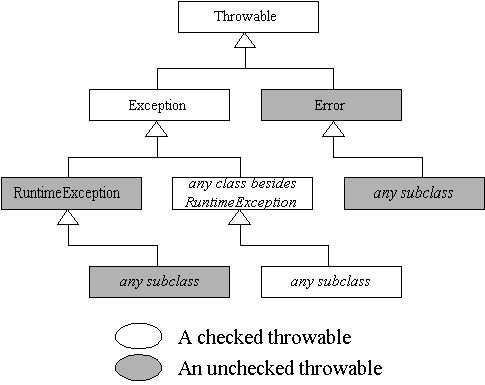Difference between Unchecked exception or runtime exception
This was an interview question. What is the main difference between unchecked exception and error as both are not caught? They will terminate the program.
-
Errors indicate fundamental problems that should never occur. If you run into an error s.th. really bad happened.
Unchecked Exceptions (Runtime Exceptions) on the other hand are used whenever an exception could be expected somehow but there is no reasonable way to deal with it then and thus a try catch statement would be just annoying and a waste of space.讨论(0) -
Checked Exception:
- The classes that extend
Throwableclass exceptRuntimeExceptionandErrorare known as checked exceptions. - Also known as compile time exception because these type of exceptions are checked at compile time. That means if we ignore these exception (not handled with
try/catchorthrowthe exception) then a compilation error occurred. - They are programmatically recoverable problems which are caused by unexpected conditions outside control of code (e.g. database down, file I/O error, wrong input, etc)
- We can avoid them using
try/catchblock. - Example:
IOException,SQLExceptionetc
Unchecked Exception:
- The classes that extend
RuntimeExceptionare known as unchecked exceptions - Unchecked exceptions are not checked at compile-time rather they are checked at runtime.And thats why they are also called "Runtime Exception"
- They are also programmatically recoverable problems but unlike checked exception they are caused by faults in code flow or configuration.
- Example:
ArithmeticException,NullPointerException,ArrayIndexOutOfBoundsExceptionetc - Since they are programming error, they can be avoided by nicely/wisely coding. For example "dividing by zero" occurs
ArithmeticEceeption. We can avoid them by a simple if condition -if(divisor!=0). Similarly we can avoidNullPointerExceptionby simply checking the references -if(object!=null)or using even better techniques
Error:
Errorrefers irrecoverable situation that are not being handled by try/catch- Example:
OutOfMemoryError,VirtualMachineError,AssertionErroretc.
讨论(0) - The classes that extend
-
Errors and runtime exceptions are collectively known as unchecked exceptions.
runtime exceptions are exceptional conditions that are internal to the application, and that the application usually cannot anticipate or recover from. These usually indicate programming bugs, such as logic errors or improper use of an API
You may want to take a look at this link which explains the Three Kinds of Exceptions.
http://docs.oracle.com/javase/tutorial/essential/exceptions/catchOrDeclare.html
I hope this helps.
讨论(0) -
As stated by their name, unchecked exceptions are not checked at compile-time which means that the compiler doesn't require methods to catch or to specify (with a
throws) them. Classes belonging to this category are detailed in the section 11.2 Compile-Time Checking of Exceptions of the JLS:The unchecked exceptions classes are the class
RuntimeExceptionand its subclasses, and the classErrorand its subclasses. All other exception classes are checked exception classes. The Java API defines a number of exception classes, both checked and unchecked. Additional exception classes, both checked and unchecked, may be declared by programmers. See §11.5 for a description of the exception class hierarchy and some of the exception classes defined by the Java API and Java virtual machine.The following picture illustrates the Exception hierarchy:

The class
Errorand its subclasses are exceptions from which ordinary programs are not ordinarily expected to recover and, as explained in 11.5 The Exception Hierarchy:The class
Erroris a separate subclass ofThrowable, distinct fromExceptionin the class hierarchy, to allow programs to use the idiom:} catch (Exception e) {to catch all exceptions from which recovery may be possible without catching errors from which recovery is typically not possible.
To summarize,
RuntimeExceptionare a subset of unchecked exceptions for exceptions from which recovery is possible (but unchecked exception is not a synonym ofRuntimeExceptionas many are answering here).讨论(0) -
RuntimeExceptionsand Errors likeOutOfMemoryErrordon't need to be catched and can be thrown until they reach main() which will terminate the application.Other Exceptions cause an compile error if they are not catched or included in the throws list.
讨论(0) -
The JavaDocs sum these up pretty well.
java.lang.RuntimeException:
RuntimeException is the superclass of those exceptions that can be thrown during the normal operation of the Java Virtual Machine.
A method is not required to declare in its throws clause any subclasses of RuntimeException that might be thrown during the execution of the method but not caught.
java.lang.Error:
An Error is a subclass of Throwable that indicates serious problems that a reasonable application should not try to catch. Most such errors are abnormal conditions. The ThreadDeath error, though a "normal" condition, is also a subclass of Error because most applications should not try to catch it.
A method is not required to declare in its throws clause any subclasses of Error that might be thrown during the execution of the method but not caught, since these errors are abnormal conditions that should never occur.
Note that "unchecked exception" is merely a synonym for a
RuntimeException.讨论(0)
- 热议问题

 加载中...
加载中...